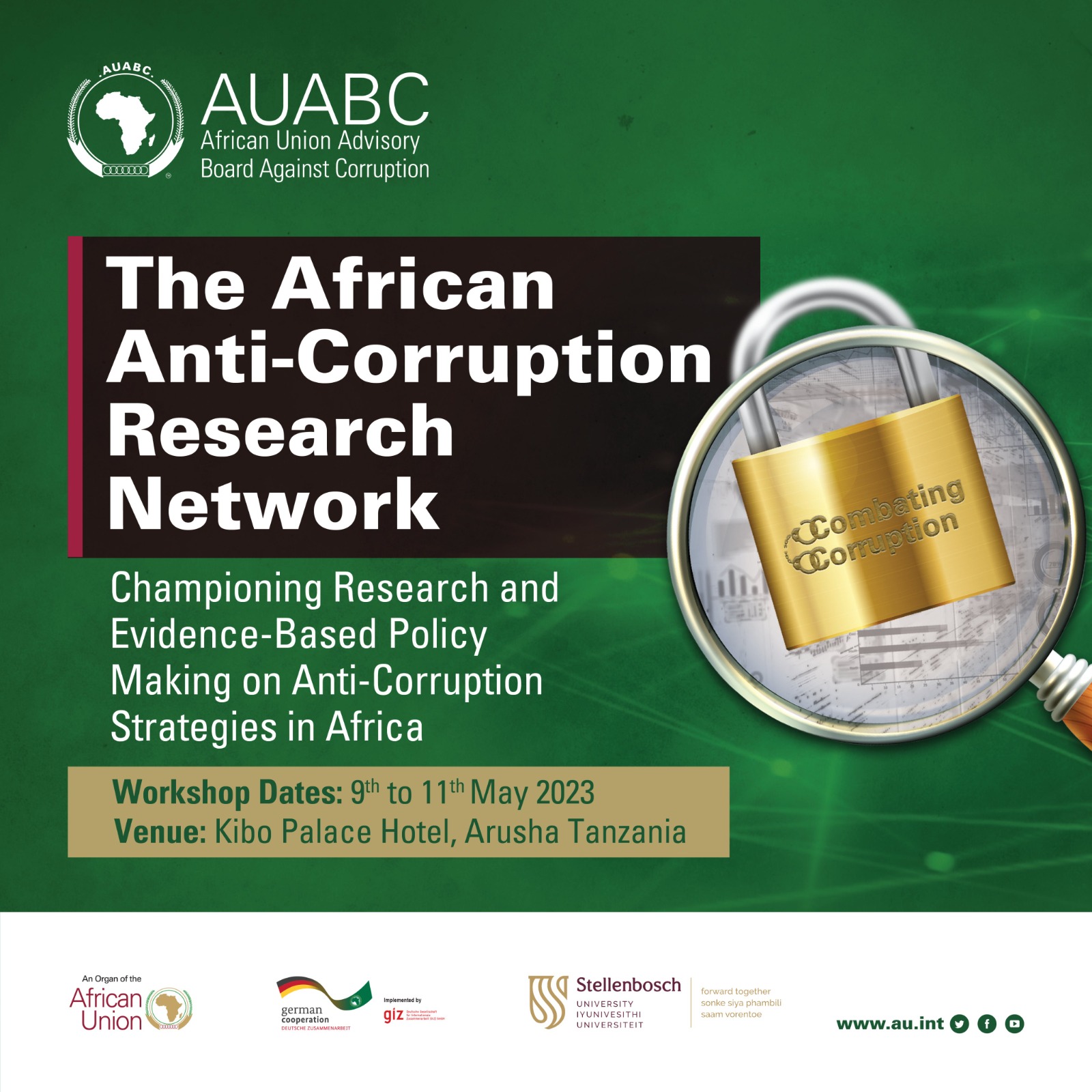|
Getting your Trinity Audio player ready...
|
By Baboloki Semele
It is all cylinders firing as the African Union Advisory Board Against Corruption-AUABC in partnership with Stellenbosch University in Western Cape, South Africa is preparing to host the African Anti-Corruption Research Network in Tanzania next week.
The anticipated workshop will run from 9th to 11th May 2023 in Arusha, Tanzania at the Kibo Palace Hotel. According to the workshop concept note, the continental workshop will be the precursor to the formation of the African Anti-Corruption Research Network, and its main objectives are to bring together researchers, anti-corruption practitioners, and key stakeholders to brainstorm and deliberate on the creation of the AACRN.
The discussions will focus on conducting a mapping and situational analysis as well as charting the course for future research, creating the AACRN, establishing working procedures and electing the coordinating group/team as well as developing a research agenda that will inform the focus and direction of the research required by the National Anti-Corruption Authorities who are a key stakeholder and primary user of the research results.
The concept note further states that the expected outcomes of the Continental workshop are to create the African Anti-Corruption Research Network, agree on working procedures and the way forward and develop a research agenda for a specific period to be agreed upon. The Workshop will consist of an opening session, highly interactive plenary sessions, and parallel working group sessions.
On the first day, the focus will be on the establishment of the AACRN along with its working procedures and guidelines. The remaining two days of the Workshop will be devoted to the development of the research agenda. The Workshop will gather participants from academia, think tanks and research networks, National Anti-Corruption Authorities, anti-corruption institutes and networks, governance and policy-making institutions as well as African Union organs.
It is anticipated that a total of 45 delegates will attend the Workshop. The African Union Advisory Board against Corruption notes that the intended African Anti-Corruption Research Network which will champion research and harvesting of knowledge and corruption/anti-corruption data. This would in turn inform policy and strategies that would effectively promote the fight against corruption on the African continent.
“There are a few research and practitioner’s networks which have done commendable works, however, there is a need to have African-oriented research that takes into consideration the peculiarities of the African governance landscape.” reads the concept note availed to this publication.
It further says this will ensure that strategies and policies developed are home-grown and it is against this background that the Board would like to convene a three-to-four-day days Continental Workshop that will brainstorm and discuss the establishment of an African Anti-Corruption Research Network.
It is expected that the network will champion and nurture the development of an African anti-corruption research agenda culminating in the development of knowledge products such as policy briefs, research notes, advisories, and later an African Anti-Corruption Journal. The African Union Convention on Preventing and Combating Corruption (AUCPCC) was adopted by Member States of the African Union at the Second Ordinary Session of the Assembly of the Heads of State and Government held in Maputo, Mozambique on 11th July 2003.
The Convention entered into force on 5th August 2006, thirty (30) days after the deposit of the fifteenth instrument of ratification. To date, forty-eight (48) countries have ratified the Convention and are State Parties to it. Article 22 (1) of the Convention birthed the African Union Advisory Board against Corruption (AUABC) bestowing upon it the broad mandate to promote and encourage the adoption of measures and actions by State Parties to prevent, detect, punish, and eradicate corruption and related offenses in Africa as well as to follow up on the adoption of those measures.
Article 22 specifically mandates the Board to, inter alia: promote and encourage the adoption and application of anti-corruption measures on the continent; collect and document information on the nature and scope of corruption and related offences in Africa; develop methodologies for analysing the nature and extent of corruption in Africa, and disseminate information and sensitize the public on the negative effects of corruption and related offenses; advise governments on how to deal with the scourge of corruption and related offences in their domestic jurisdictions.
Since its inception, the AUABC has been fulfilling this mandate through a myriad of activities and projects including country reviews on progress made in fighting corruption and implementation of anti-corruption treaties; capacity building and peer learning through benchmarking visits; providing various platforms for both State and non-state actors to share knowledge and good practices.






